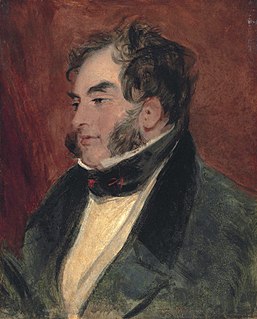 W
WWilliam Arden, 2nd Baron Alvanley was a British Army officer, peer and socialite, who was a friend of Beau Brummell and one of a close circle of young men surrounding the Prince Regent.
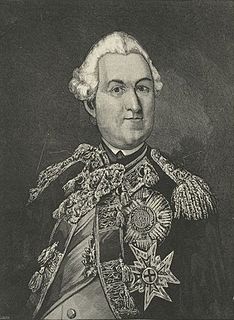 W
WRichard Coote, 1st Earl of Bellomont, known as The Lord Coote between 1683–89, was a member of the English Parliament and a colonial governor. Born in Ireland, he was an early supporter of William III and Mary II, siding with them in the Glorious Revolution.
 W
WSir Henry de Bohun was an English knight, the grandson of Humphrey de Bohun, 2nd Earl of Hereford. He was killed on the first day of the Battle of Bannockburn by Robert the Bruce. Riding in the vanguard of heavy cavalry, de Bohun caught sight of the Scottish king who was mounted on a small palfrey (ane gay palfray Li till and joly) armed only with a battle-axe. De Bohun lowered his lance and charged, but Bruce stood his ground. At the last moment Bruce manoeuvred his mount nimbly to one side, stood up in his stirrups and hit de Bohun so hard with his axe that he split his helmet and head in two. Despite the great risk the King had taken, he merely expressed regret that he had broken the shaft of his favourite axe.
 W
WGeorge Villiers, 2nd Duke of Buckingham, 20th Baron de Ros, was an English statesman and poet.
 W
WJames Hay, 1st Earl of Carlisle KB was a British noble.
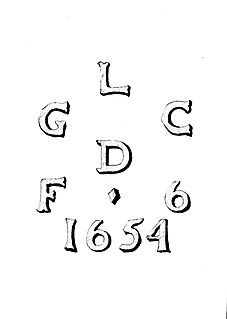 W
WGeorge Brydges, 6th Baron Chandos (1620–1654), was the son of Grey Brydges, 5th Baron Chandos and Lady Anne Stanley, a descendant of King Henry VIII's sister, Princess Mary Tudor. George's stepfather was Mervyn Tuchet, 2nd Earl of Castlehaven. In 1621, George succeeded his father as Baron Chandos, being only just one years of age.
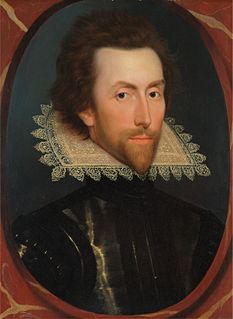 W
WGrey Brydges, 5th Baron Chandos of Sudeley Castle in Gloucestershire, was an English nobleman and courtier.
 W
WPhilip Stanhope, 2nd Earl of Chesterfield PC FRS was a peer in the peerage of England.
 W
WSir Kenelm Digby was an English courtier and diplomat. He was also a highly reputed natural philosopher, astrologer and known as a leading Roman Catholic intellectual and Blackloist. For his versatility, he is described in John Pointer's Oxoniensis Academia (1749) as the "Magazine of all Arts and Sciences, or the Ornament of this Nation".
 W
WEdward Sackville, 4th Earl of Dorset KG was an English courtier, soldier and politician. He sat in the House of Commons from 1621 to 1622 and became Earl of Dorset in 1624. He fought a duel in his early life, and was later involved in colonisation in North America. He supported the Royalist cause in the English Civil War.
 W
WSir William Drury was an English landowner and member of parliament. He was the father of Sir Robert Drury, patron of the poet John Donne.
 W
WRobert Fielding was an English bigamist and rake in the late 17th and early 18th centuries. He was known as a handsome womanizer at the royal court of King Charles II, where he was given the nicknames "Beau" and "Handsome" Fielding, and later became the bigamous husband of the King's former mistress, Barbara Villiers, the first Duchess of Cleveland.
 W
WPrince Frederick, Duke of York and Albany was the second son of George III, King of the United Kingdom and Hanover, and his consort Charlotte of Mecklenburg-Strelitz. A soldier by profession, from 1764 to 1803 he was Prince-Bishop of Osnabrück in the Holy Roman Empire. From the death of his father in 1820 until his own death in 1827 he was the heir presumptive to his elder brother, George IV, in both the United Kingdom of Great Britain and Ireland and the Kingdom of Hanover.
 W
WSir Oliver St John, 1st Viscount Grandison was an English soldier and politician who became Lord Deputy of Ireland.
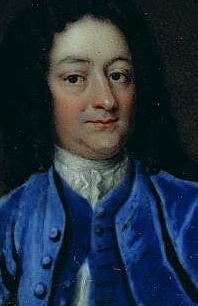 W
WLieutenant General Henry Hawley was a British army officer who served in the wars of the first half of the 18th century. He fought in a number of significant battles, including the Capture of Vigo in 1719, Dettingen, Fontenoy and Culloden.
 W
WAgnes Hotot was an English noblewoman known for besting a man in a lance fight. According to Arthur Collins writing in 1741, an unspecified monk recorded that Hotot took her father's place in a duel after he fell ill, disguising herself as a man, and only revealed her true identity after knocking her opponent off his horse. When Hotot later married into the Dudley family of Clapton, Northamptonshire, the Dudleys commemorated her exploits with a new crest depicting a woman wearing a war helmet.
 W
WSir Jeffrey Hudson was a court dwarf of the English queen Henrietta Maria of France. He was famous as the "Queen's dwarf" and "Lord Minimus", and was considered one of the "wonders of the age" because of his extreme but well-proportioned smallness. He fought with the Royalists in the English Civil War and fled with the Queen to France but was expelled from her court when he killed a man in a duel. He was captured by Barbary pirates and spent 25 years as a slave in North Africa before being ransomed back to England.
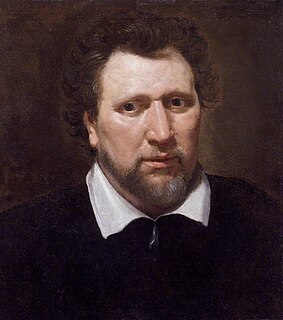 W
WBenjamin Jonson was an English playwright and poet. Jonson's artistry exerted a lasting influence upon English poetry and stage comedy. He popularised the comedy of humours; he is best known for the satirical plays Every Man in His Humour (1598), Volpone, or The Fox, The Alchemist (1610) and Bartholomew Fair (1614) and for his lyric and epigrammatic poetry. "He is generally regarded as the second most important English dramatist, after William Shakespeare, during the reign of James I."
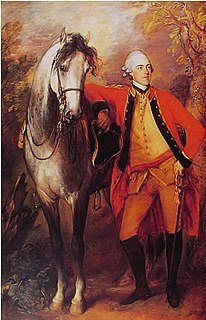 W
WLieutenant General Edward Ligonier, 1st Earl Ligonier KB was a British soldier and courtier. He was the illegitimate son of Col. Francis Augustus Ligonier, the brother of John Ligonier, 1st Earl Ligonier.
 W
WJohn Lowther, 1st Viscount Lonsdale, PC FRS, known as Sir John Lowther, 2nd Baronet, from 1675 to 1696, was an English politician.
 W
WSir Robert Mansell (1573–1656) was an admiral of the English Royal Navy and a Member of Parliament (MP), mostly for Welsh constituencies. His name was sometimes given as Sir Robert Mansfield and Sir Robert Maunsell.
 W
WHenry Percy, Baron Percy of Alnwick, son of Henry Percy, 9th Earl of Northumberland, sat in the Short Parliament as the member for Portsmouth, and in the Long Parliament an M.P. for Northumberland; an originator of the "first army plot" in 1641, after which he retired to France. He was appointed general of the ordnance of the king's army and created baron, 1643; but fell in disgrace in 1644 through his desire for peace. In 1648 he resigned his command and went to France where he joined Queen Henrietta Maria's party. He died in France around March 1659.
 W
WMary Read, also known as Mark Read, was an English pirate. She and Anne Bonny are two of the most famed female pirates of all time, and among the few women known to have been convicted of piracy during the early 18th century, at the height of the "Golden Age of Piracy".
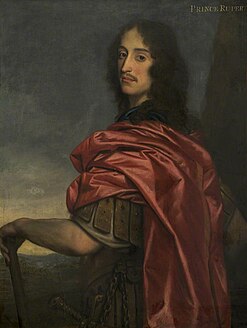 W
WPrince Rupert of the Rhine, Duke of Cumberland, was a German-English army officer, admiral, scientist and colonial governor. He first came to prominence as a Royalist cavalry commander during the English Civil War. Rupert was the third son of the German Prince Frederick V of the Palatinate and Elizabeth, eldest daughter of King James VI and I of Scotland and England.
 W
WJohn Smith was an English soldier, explorer, colonial governor, Admiral of New England, and author. He played an important role in the establishment of the colony at Jamestown, Virginia, the first permanent English settlement in America, in the early 17th century. He was a leader of the Virginia Colony between September 1608 and August 1609, and he led an exploration along the rivers of Virginia and the Chesapeake Bay, during which he became the first English explorer to map the Chesapeake Bay area. Later, he explored and mapped the coast of New England. He was knighted for his services to Sigismund Báthory, Prince of Transylvania, and his friend Mózes Székely.
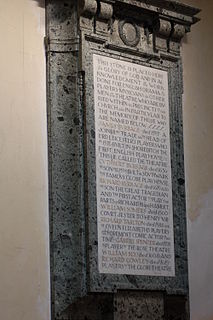 W
WGabriel Spenser, also spelt Spencer, was an Elizabethan actor. He is best known for episodes of violence culminating in his death in a duel at the hands of the playwright Ben Jonson.
 W
WField Marshal George Townshend, 1st Marquess Townshend, PC, known as The Viscount Townshend from 1764 to 1787, was a British soldier and politician. After serving at the Battle of Dettingen during the War of the Austrian Succession and the Battle of Culloden during the Jacobite Rising, Townshend took command of the British forces for the closing stages of the Battle of the Plains of Abraham during the Seven Years' War. He went on to be Lord Lieutenant of Ireland or Viceroy where he introduced measures aimed at increasing the size of Irish regiments, reducing corruption in Ireland and improving the Irish economy. In cooperation with Prime Minister North in London he solidified governmental control over Ireland. He also served as Master-General of the Ordnance, first in the North Ministry and then in the Fox–North Coalition.